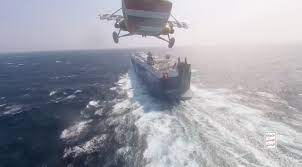“IMF: Houthi Attacks Cause a 30% Drop in Red Sea Shipping”
The International Monetary Fund (IMF) has reported a significant decline of nearly 30% in container shipping through the Red Sea, attributing the downturn to ongoing attacks by Yemen’s Houthi rebels. Jihad Azour, director of the IMF’s Middle East and Central Asia department, highlighted the impact, stating that “the drop in trade accelerated in the beginning of this year.”


The International Monetary Fund (IMF) has reported a significant decline of nearly 30% in container shipping through the Red Sea, attributing the downturn to ongoing attacks by Yemen’s Houthi rebels. Jihad Azour, director of the IMF’s Middle East and Central Asia department, highlighted the impact, stating that “the drop in trade accelerated in the beginning of this year.”
The Houthi rebels, backed by Iran, have conducted more than 30 attacks on commercial shipping and naval vessels since November 19, according to information from the Pentagon. The attacks are purportedly in solidarity with the Palestinians and in protest of the Israel-Hamas conflict in the Gaza Strip.
The IMF’s PortWatch platform reveals a 37% decrease in total transit volume through the Suez Canal in the early weeks of this year compared to the same period in the previous year. The Suez Canal, connecting the Red Sea to the Mediterranean Sea, is a crucial passage for global trade.
Houthi attacks have prompted some shipping companies to detour around southern Africa to avoid the Red Sea, a route that typically handles around 12% of global trade, as reported by the International Chamber of Shipping.
Jihad Azour expressed concern about the high level of uncertainty, stating, “The developments will determine the extent of change and shift in trade patterns in terms of volume but also in terms of sustainability. Are we on the verge of major change in trade routes or is it temporary because of the increase in costs and the deterioration of security?”
The United States, leading a coalition to protect Red Sea shipping, is considering redesignating the Houthi rebels as a “terrorist” group to apply diplomatic and financial pressure. European nations are also exploring measures to safeguard maritime traffic through the Red Sea, with the European Union planning its own naval mission.
This revelation comes as the IMF releases a revised economic outlook for the Middle East and North Africa, adjusting growth forecasts to 2.9% for 2024 due to the impact of the Israel-Hamas conflict. The economic downturn is particularly severe in the occupied West Bank and the Gaza Strip, with Gaza experiencing an estimated GDP growth of minus six percent in 2023.
The IMF projects continued economic contraction in 2024 for the region if hostilities persist without a swift cessation and reconstruction effort. Emerging market and middle-income economies in the area face increased funding requirements, projected at $186 billion for 2024, up from $156 billion in 2023.
Sources By Agencies




